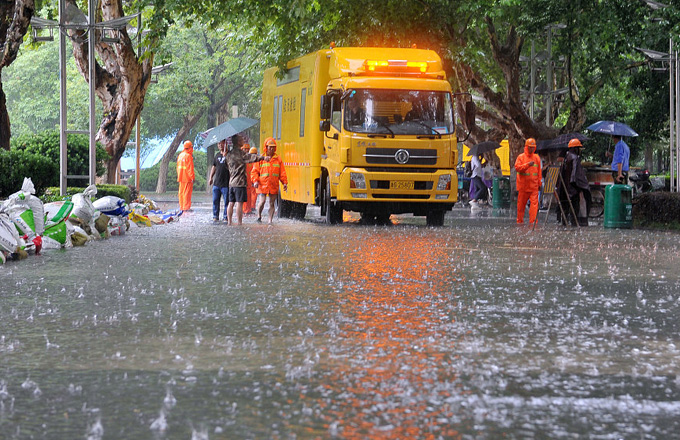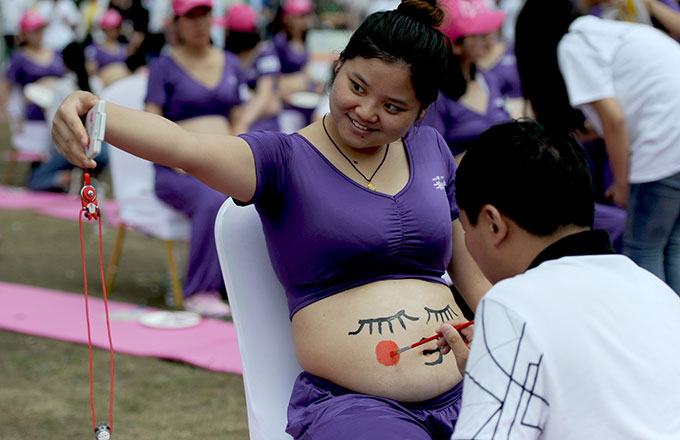On consolidating national defence enterprises
August 3, 1975
In recent months, the Central Committee of the Party has issued several consecutive documents on solving problems in railway work and in iron and steel production. These documents have made clear our principles and policies. Since I have been asked to make some comments here, I shall repeat some things I have said before.
First, it is essential to establish bold leadership in every factory and enterprise. Apparently this has already been done in most cases. In units beset with long-standing difficulties, the basic problem is timid leadership. It is utterly impossible to combat factionalism without a leadership which ``puts daring first''. And without such leadership, there is no possibility of establishing the essential rules and regulations or of implementing Party policies. Some people are simply overcautious. That may have been a defensible attitude in past years, and we cannot say that everyone who adopted it was a bad comrade. But for Communist Party members it was wrong to be overcautious even then. Still, they can be forgiven, considering the situation at the time. But if these persons are still overcautious now that the central authorities are supporting the localities, and the leading bodies at the higher levels are supporting those at the lower levels, they have only themselves to blame for their waning revolutionary will and lack of revolutionary drive. No other conclusion is possible. As for those leading cadres who ``put fear first'', do not work, take long recuperation leaves for minor illnesses or moan and groan about imaginary illnesses, we may as well ask them to take a good long rest. How can we let them hang on to their posts without doing any work? These problems of the leading bodies must be solved promptly. We should try to find daring, capable comrades to assume responsibility. This matter should be given immediate attention, particularly by provincial Party secretaries in charge of industrial affairs. The main thing is to select good persons for the two top posts in each enterprise. If these two dare to act, they can carry the whole staff along with them. We should select and recruit into the leading bodies cadres who have some practical experience and are relatively young, say, in their fifties or forties -- or if we can find still younger ones, so much the better. Such people are always available. If it is difficult to find them in your own factory, look for them in other factories or elsewhere in the region. It is simply inconceivable that no such people can be found! We should select capable people and train them well.
Second, it is essential to give top priority to quality in production. This is a very important principle, especially where military products are concerned. An entire military operation may be adversely affected if a few shells misfire on the battlefield at a critical moment. This problem merits special attention, since today military products mean modern weapons. I have read some reports lately which give figures for the output of certain national defence factories and which state that over 95 per cent of their products are of good or relatively good quality. You should never be satisfied with such figures, and in the future we should not merely talk about percentages. It doesn't solve the problem to say that most products are of good quality. Sometimes things go wrong precisely because of key products and key parts that constitute 1 or even 0.5 per cent of total output. The Office of National Defence Industries should keep this problem in mind. Airplane accidents are numerous nowadays, and of course some are attributable to the poor training of the men, the incompetence of the pilots or the deficiencies of the ground-control crews. But sometimes the fault may lie in the quality of the aircraft. A number of accidents have been due to defective parts or components that represent only 1 or even 0.5 per cent of total output. It was that 0.5 per cent which got past quality control without being detected. Investigation has shown that the failure of several of our scientific research projects was due not to deficiencies in our technology but to that 1 or even 0.5 per cent of substandard parts, parts which fell just a tiny bit short of the specifications. This question of quality is related to rules and regulations. Without the necessary responsibility system it will be difficult to ensure quality. We must improve our work in this respect. At the same time, comrades in charge of the national defence industries are requested to give high priority to scientific research programmes, for there are a number of military products which cannot be put into normal production because the technology hasn't been perfected. We should encourage scientific and technical personnel to use their initiative and we should set up three-in-one combinations. Scientists and technicians should not feel downcast. True, they have been called ``Number Nine'', but Chairman Mao says: ``We can't do without Number Nine.'' That is to say, scientists and technicians should be given their proper due. Although they may have shortcomings, we should help and encourage them. Better conditions should be created for them so that they can devote themselves single-mindedly to their work. This will surely do much to advance our cause.
Third, it is essential to look after the well-being of the masses. This cannot be accomplished by just saying a few words; it requires a lot of down-to-earth work. For instance, steel workers do heavy labour, yet they don't get enough meat and vegetables to eat. This means that even the basics are not guaranteed. Such problems must be concretely studied and solved. Cities with a lot of industry should give them special attention. We all know that some cadres like to raise chickens, rabbits and ducks. In my opinion, the problems would be easily solved if these cadres showed less enthusiasm for bettering their own standard of living and more for raising that of the masses. The commercial work connected with factories in the mountainous regions of the ``third line'' should also be improved. I am from Sichuan, and I am often told by workers from my native province that they can't get enough meat and vegetables. This scarcity of non-grain foods exists not only in Sichuan but in many other places as well. Remedial measures should be adopted. For example, part of the land around Chongqing could be specially allocated to the growing of vegetables. Their produce should be supplied first to factory workers and then to other city dwellers. In this way, workers would enjoy a somewhat better diet and peasants a higher income. This arrangement would also help to improve relations between workers and peasants. We are presently considering whether we can allocate some grain to the suburbs of a few cities for the raising of pigs. For instance, we might allocate 250 million kilogrammes of grain for the raising of five million pigs. This grain would not be subject to nationwide distribution but put to special use in pig-raising in several selected centres. We could even consider setting up some modern poultry farms. This question too should be studied. But we should put the major emphasis on pig-raising. Raising more pigs will both increase the cash income of the peasants and provide more manure for expanding grain production. Heavy manual labour is still strenuous, and it is essential to improve the standard of living of workers. There is a lot of talk among the masses about matters concerning their daily life, and we shouldn't take everything they say simply as grumbling. Our Party and state must be concerned with the well-being of the masses, and it is high time we put this question on our agenda.
(Speech at a conference on key enterprises of the national defence industries.)
(From Selected Works of Deng Xiaoping, Volume II <1975-1982>)
- China issues guidelines to develop 'all-for-one' tourism demonstration zones
- Torrential rain triggers disaster in Southwest China
- Harvest time for wheat reapers in Shanxi
- Over 200 couples marry in Changchun group wedding
- Calligraphy tops other icons of Chinese culture, WeChat data shows

























